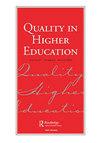Quality management, performance measurement and indicators in higher education institutions: between burden, inspiration and innovation
IF 1.1
Q3 EDUCATION & EDUCATIONAL RESEARCH
引用次数: 3
Abstract
ABSTRACT Performance indicators are increasingly used to measure the performance and quality of higher education. The purpose of this article is to discuss their role for reflecting on the challenges faced by high-participation higher education systems, regarding quality of student outcomes, equity of access, societal relevance and financial sustainability. Based on a review of existing international comparable metrics, policy and scholarly literature on higher education performance, the article discusses the strengths and weaknesses of current performance indicators and the perennial tension between the burden of accountability and the inspiration and innovation that may result from the developmental use of performance indicators for improvement. It concludes by summarising some observable results of performance and quality management and reflecting on some possible future trajectories.高等教育机构的质量管理、绩效衡量与指标:在负担、激励与创新之间
绩效指标越来越多地用于衡量高等教育的绩效和质量。本文的目的是讨论它们在反映高参与度高等教育系统所面临的挑战方面的作用,这些挑战涉及学生成果质量、入学公平、社会相关性和财务可持续性。基于对现有的国际可比指标、政策和高等教育绩效学术文献的回顾,本文讨论了当前绩效指标的优势和劣势,以及责任负担与绩效指标的发展使用可能带来的灵感和创新之间的长期紧张关系。最后总结了绩效和质量管理的一些可观察到的结果,并反映了一些可能的未来轨迹。
本文章由计算机程序翻译,如有差异,请以英文原文为准。
求助全文
约1分钟内获得全文
求助全文
来源期刊

Quality in Higher Education
EDUCATION & EDUCATIONAL RESEARCH-
CiteScore
3.30
自引率
14.30%
发文量
32
期刊介绍:
Quality in Higher Education is aimed at those interested in the theory, practice and policies relating to the control, management and improvement of quality in higher education. The journal is receptive to critical, phenomenological as well as positivistic studies. The journal would like to publish more studies that use hermeneutic, semiotic, ethnographic or dialectical research as well as the more traditional studies based on quantitative surveys and in-depth interviews and focus groups. Papers that have empirical research content are particularly welcome. The editor especially wishes to encourage papers on: reported research results, especially where these assess the impact of quality assurance systems, procedures and methodologies; theoretical analyses of quality and quality initiatives in higher education; comparative evaluation and international aspects of practice and policy with a view to identifying transportable methods, systems and good practice; quality assurance and standards monitoring of transnational higher education; the nature and impact and student feedback; improvements in learning and teaching that impact on quality and standards; links between quality assurance and employability; evaluations of the impact of quality procedures at national level, backed up by research evidence.
 求助内容:
求助内容: 应助结果提醒方式:
应助结果提醒方式:


